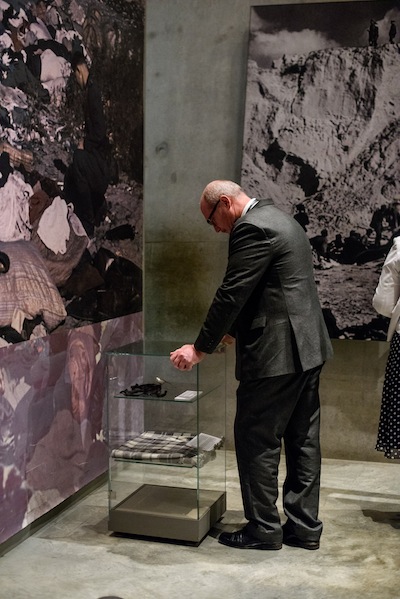B.C. Finance Minister Michael de Jong speaks at the Canadian reception in Tel Aviv, kicking off the Nov. 13-17 trade mission to Israel. (photo from flickr.com/photos/bcgovphotos)
In November, B.C. Minister of Finance and House Leader Michael de Jong led a provincial trade mission to Israel. The invitation to delegates was sent by the minister and Dr. Moira Stilwell, MLA for Vancouver-Langara.
“A lot of the impetus for this [mission] derived from the tech sector, the health sciences sector, the cybersecurity sector itself here in B.C., who said, look, we are seeing increasing opportunities and we’d like to explore those further, is the government prepared to work with us?” de Jong told the Independent in a phone interview. “And that led to a conversation between myself and Moira – of course, she has been, for many years, a big proponent of growing the bilateral relationship – and, out of that emerged this formal trade delegation.”
It was de Jong’s second mission to Israel. His first was about five years ago, during his tenure as the province’s minister of health.
“The role the government and a minister can play is to help facilitate partnerships and contacts between people, and this particular group had done a lot of that work themselves,” he said. “So, for example, the Rick Hansen Institute had already created the beginnings of a partnership with Hadassah [Medical Centre] and we saw that go to the next level in terms of formalization. We went out to Technion University, which is this world-leading institute – in their hallway, they feature Nobel laureates the way other institutions feature alumni – it’s quite remarkable…. [On] the cybersecurity side, some of the folks who were with us are even now actively pursuing with colleagues in Israel opportunities for exchange and for trade and, ultimately, that’s what this is all about.”

Delegates on the Nov. 13-17 mission traveled to Tel Aviv, Jerusalem, Beersheva, Haifa and the West Bank to meet with various government, university and other stakeholders. Among those accompanying de Jong was Nico Slobinsky, director of the Centre for Israel and Jewish Affairs, Pacific Region. CIJA hosted an optional tour and Shabbat dinner on Nov. 18 for delegates who stayed after the mission was officially over, Slobinsky told the Independent.
“CIJA was delighted by the Government of British Columbia’s initiative to lead a trade delegation to Israel composed of B.C. entrepreneurs and professionals involved in life sciences and cybersecurity,” he said. “This mission assisted in cementing existing relationships, creating new partnerships and promoting opportunities in the province by deepening the economic, cultural and academic ties between Israel and B.C.”
One of those ties was with the Centre for Health Evaluation and Outcome Sciences (CHÉOS), a centre of the Providence Health Care Research Institute and the University of British Columbia faculty of medicine.
“Israel is viewed as a world exemplar in science, technology and commercialization – a place where we can learn, but also can share best practices from B.C.,” said Prof. Robert Sindelar, who, among other things, serves as an advisor to CHÉOS. He added, “Having participated in valuable and hugely beneficial B.C. trade missions previously to China and India, I said yes immediately when I had received the invitation to consider participating in a B.C. trade mission to Israel from the B.C. Ministry of International Trade.”
About the November trip, he said, “From our very first meeting in Israel to the very last meeting, I was continually impressed by our Israel hosts’ efforts to: 1) openly and candidly share valuable insight and details of their successes and endeavors with our delegation, and 2) the immediate connection in person or via email within 24 hours of an event to further explore potential opportunities and collaborations. Thus, we are already working together on several possible collaborations between Israel and B.C.”
Being a multidisciplinary health research centre, CHÉOS looks “to partner and collaborate with synergistic and like organizations researching at the cutting-edge of health and wellness,” said Sindelar. “Thus, true partnerships and collaborations with the best health-outcomes organizations in the world – sharing knowledge, skills and new methodologies – is a continuing goal for us. Each and every life-science event planned for the B.C. trade mission to Israel provided an opportunity and unique ideas for possible collaborations for CHÉOS health scientists and clinicians at a world-class level.”
Of course, the relationship with Israel extends beyond British Columbia to all of Canada.
“There is this very strong political and cultural tie,” said de Jong. “I think we still underachieve with respect to trade. I think there is genuine room for growth on the trade front. There are some emerging opportunities, as Israel begins to explore offshore energy potential.”
As well, “we have room to learn from the ‘start-up nation,’” said de Jong. “You go down to Beersheva, for example, and see how they have managed to create a technology hub in concert with the university there and the community there, and you see elements of that beginning to develop in British Columbia, in the Lower Mainland, in Victoria, but there are some real lessons to be learned.
“Frequently, the conversations began with the Israeli representatives reminding us of the unique challenges that they face and how innovation is borne out of necessity – smaller population base, smaller country, neighbors that aren’t always particularly friendly and, in some cases, are downright hostile, and, out of that, out of necessity, innovation has emerged. At one point, I replied to a group, acknowledged that and said I want you to think about another form of necessity. Imagine four-and-a-half million people in an area the size of Europe … well, that’s our circumstance. That breeds a different kind of innovation … 35 million people in a country that’s the second-largest country in the world. And so, we have to innovate in order to achieve a standard of living that is amongst the highest in the world, with vast distances and a very small population base, and we may have something to teach you about that. Different circumstances, both have required a degree of unique innovation, and two countries that have performed remarkably well economically.”
The cost of the trip, which included travel to Israel and England for the minister and his chief of staff, came in slightly below the ministry’s $25,000 estimate, said de Jong.
“It costs money,” he said. “You go to these hotels and, if you can find one that’s below $300 a night, you’re lucky. It’s not cheap.”
But, he explained, “It’s well spent if it facilitates business and trade. If it doesn’t, then it is not a sound investment. We try to track the trade stats and the partners that came with us and do the follow-up.”
Regarding that follow-up, he said, “Well, the trade ministry, who were also represented on the trip, will be following up with the members of the delegation; in some cases, providing additional information to folks we met in Israel. In a couple of cases, there are groups there who have indicated a desire to come here to follow-up. The ultimate test of success is the degree to which investment flows out of Israel into British Columbia and out of B.C. into Israel, and we see increased levels of commerce and trade in goods and services. We can dress it up any way we want, but that’s the measure of success. If, a year or two from now, our trade levels remain the same, then it hasn’t been a success.”
To those who support the boycott, divestment and sanction movement, de Jong said, “I disagree with the approach. I see benefits for British Columbia in developing and enhancing the trade relationship, benefits for Canada; I see benefits for Israel, I see benefits for the region. I met with the finance minister for the Palestinian Authority, went into Ramallah, had a conversation, obviously got a perspective on some of the economic challenges that they are facing. I had met earlier that day or the day previous with the Israeli health minister. There is a vexing challenge there, and I’m not going to pretend to have the recipe for resolution, but I do know that Canada and Canadians are well-regarded within Israel and, my impression was, amongst the Palestinian officials. To the extent that we can encourage or influence the prospect of negotiations and resolution, so much the better.”
After the mission to Israel, de Jong stopped in London, where British Columbia was honored by the London Stock Exchange for innovation in financial capital markets.
“As finance minister over the last five years, there’s a bit of a pattern,” said de Jong of his international travel in general. “After the budget, I’ll usually do a tour involving the North American markets, so Toronto, Montreal, New York, Boston, Chicago, that sort of triangle, if you will. We also have a lot of investors in Europe, so every second year, there will be a European show.
“As forestry minister, those were the years we were opening up the China market and were very active there, happily. It’s paying dividends now. And, more recently, we were the first government anywhere in the world to issue what are called ‘dim sum and panda bonds,’ one is offshore, one is onshore, Chinese currency bonds.
“Earlier, I mean just before I was in Israel, I was in India. We were the first government anywhere in the world to issue what are called ‘masala bonds,’ rupee-denominated bonds. We’re able to do these things because we’re triple-A … so we can go where no one has gone before … and break new ground. On the way back from Israel, I stopped in London, and the reason the stock exchange wanted to honor British Columbia was for creating an entire new trade through this masala bond. We issue it out of London and now, of course, others are following.”
According to Jewish Federation of Greater Vancouver chief executive officer Ezra Shanken, in his Nov. 18 e-newsletter, other local Jewish community members who joined the B.C.-Israel mission were Candace Kwinter, who is on Federation’s Israel and overseas affairs committee and CIJA-PR’s Local Partnership Council; Paul Goldman, who is CIJA’s immediate past chair; and Eli Mann, chief executive officer of Shield4UC, who also serves on Federation’s community security advisory committee.

